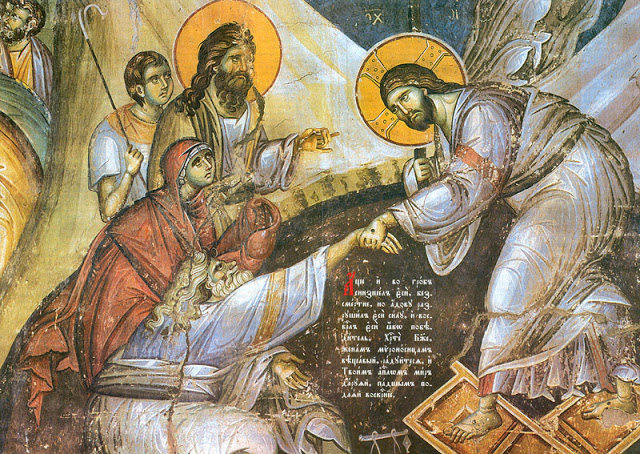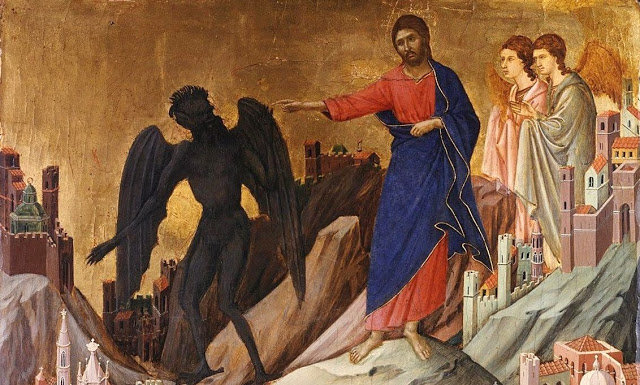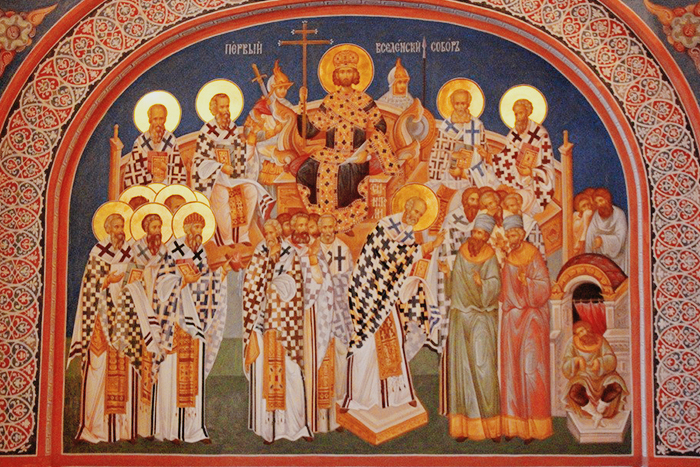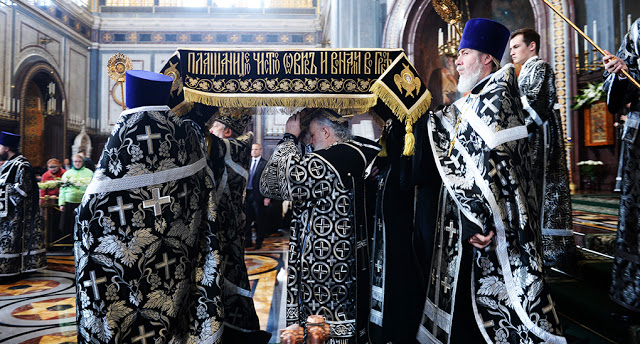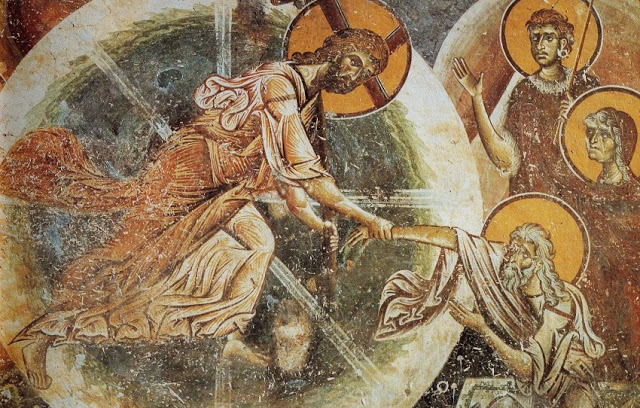
Christ revealed to us that He will come at His Second Coming to judge the living and the dead. There is a well-known passage in Holy Scripture about the future Judgment, in which He will separate human beings, as a shepherd separates the sheep from the goats, and after an exchange of words, the righteous will go “into eternal life” and the sinners “into everlasting punishment” (St. Matthew 25:46). In the Creed (Symbol of faith) we confess, “And He shall come again with glory to judge the living and the dead.”
Before the Second Judgment the bodies of human beings will be resurrected. The first and second resurrections were mentioned earlier. The first resurrection is experienced through Baptism and Holy Communion, and the second resurrection is after Christ’s Second Coming, so that the whole human being may live ‘eternal well-being’ or ‘eternal distress.’
The iconography of the Second Coming of Christ shows what Paradise is and what Hell is.
“Please go and find the icon of the Second Coming, and you will see that around Christ are those who are in Paradise. They are in a golden light; the light surrounding them is golden. This same golden light, as it gets further away from Christ, begins to change color, and gradually, the further away it goes, it turns from gold to red; and in the red light are the damned. The saved see Christ in a golden color, and the damned also see Christ from a distance, but they see the Light of Christ as red, because for the former it is the glory of God and for the latter it is the eternal fire, outer darkness and ‘the consuming fire.'”
From this point of view, therefore, we Orthodox Christians agree with the most liberal people in the world. No message can be more liberal than that of the Holy Fathers of the Church, who not only stress that, ‘Son, we’ll all go to the same place’, as an old lady told me, but also emphasize that God loves everyone equally: the damned and the saved, the glorified and the saints, Angels and devils, good and bad, prostitutes and chaste…God loves all human beings equally, He loves everyone without distinction. From God’s point of view, God saves everyone. He wants the salvation of all human beings, and he has preordained salvation for all.
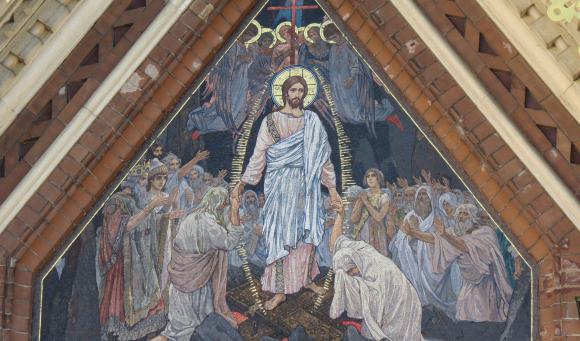
How do we know this? Because even Hell is salvation (the human being is preserved) and Hell is a way of making perfect, but it is Hell and not Paradise. Because the one who is damned is incapable of progress, he is unable to accept progress towards perfection. Why? Because his conscience has been hardened, his heart has grown hard. He remains so egoistic and self-centered that his personality cannot develop from selfishness to unselfishness. Since he cannot develop anymore, he is perfected in his selfishness. Even Hell is evil for him. Although it is not punishment from God’s point of view, it is punishment from the human point of view.
In other words, the man has remained uncured. Why? Because his heart needed to be cured, his heart or his nous (soul) was sick, and they did not receive treatment. But where does this treatment begin, how does it take place and how a human being secure it? In the Orthodox Christian experience, treatment begins here in this world.”
In the Western (Roman Catholic and Protestant) tradition about Paradise and Hell, we see view that differ from the Orthodox Christian teaching.
“Augustine’s teachings about absolute predestination Hell and Paradise were based on those perceptions that he had, his legalistic views about the Fall of man and sin, combined with his neoplatonic perception of Paradise. He introduced into Christianity the idea that Hell is the subterranean regions underneath the earth, where people go to be punished. Paradise is outer space.
In those days they believed that things that were immutable were beyond the heavenly bodies, where there is no movement and no development, and that here on earth is the place of testing. So if we are good boys and girls we shall go to Paradise above the stars and the sky; and if we are bad we shall go under the earth to be punished in the subterranean regions.”
Paradise in the Western (Latin or Roman Catholic) tradition was connected with the soul’s happiness and the satisfaction of its desires.
“In the Orthodox Christian Tradition there is nothing like this. Why? Because man’s destiny is not happiness; it is not satisfaction of his desires. The Holy Fathers do not teach that God will become man’s possession or that man can use God–let alone his fellow human being–for his own happiness.
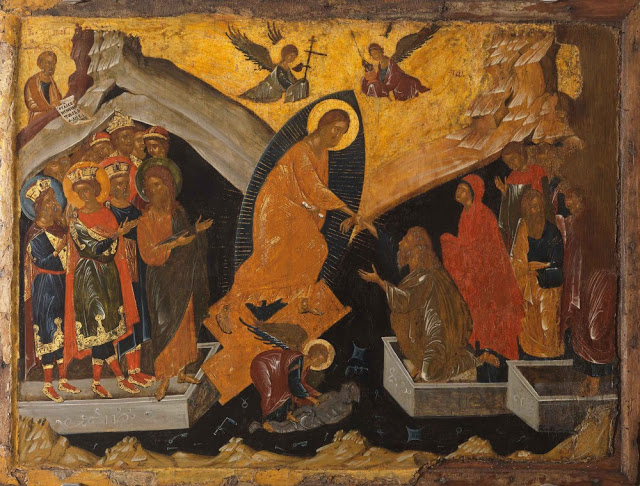
The capitalistic foundations that exist within the philosophy of medieval feudalism originate from Augustine, but mainly from the ancient Greeks. The teaching about the pursuit of happiness (eudemonism) started from the ancient Greeks, from Plato and Aristotle, with some opposition from the Stoics and the Epicureans. In the Christian tradition of the West, however, Aristotle and Plato prevailed. These elements do not exist in patristic theology.”
In our own Holy Tradition, the human being is eternally advancing to higher stages of perfection. For us history never stops. There is the history of the saints and there is also the eternal history of man. The fact that Christ was Resurrected with His Body and that Christ is fully human until now and for ever and ever means that Christ, His Body and His human nature, is part of history. Has His Body not acted continually until this day? There has been a succession of actions; the energies of the Body of Christ have not ceased. So the Body of Christ is an inseparable part of history, which is a guarantee that history is eternal. History will not come to a halt; although a number of theologians who believe in Plato say nowadays that history will cease. No, history will not come to a halt. Why will history not cease? Because the Body with which Christ was resurrected will exist for ever, and we shall be resurrected with bodies. We shall not be merely souls in paradise. We shall be complete human beings.
Then Westerners speak about Paradise and Hell from the standpoint of justice. This is sociological interpretation of eternal life…
“…Holy Scripture uses the words ‘light’ and ‘dark cloud’ to describe the state of the just, and the words ‘fire’ and ‘darkness’ to describe the state of sinners. We know, however, that the light is different from the dark cloud that covers the light. And fire is the opposite of darkness, because fire chases away darkness and illuminates the surroundings.
This shows that there are not created words to express uncreated reality absolutely. The Eternal Divine Light and the Eternal Life are uncreated. They are the energy of God that is experienced by human beings as illuminating or burning
energy, depending on their spiritual state.
energy, depending on their spiritual state.
“All human beings will see the glory of God, and from this point of view they have the same end. Everyone will certainly see the glory of God, the difference being that, whereas the saved will see the glory of God as sweetest light without evening, the damned will see the same glory of God as consuming fire, as fire that will burn them. It is a true and predictable fact that we shall all see the glory of God. Seeing God, that is to say, His glory and His Light, is something that will happen whether we want it or not. The experience of this Light, however, will be different for the two categories.
The work of the Church and the priests is not to help us to see this glory, because that will happen in any case. The work of the Church centers on how each one will see God. Not on whether he will see God. In other words, the task of the Church is to preach to people that the true God exists, that God is revealed either as light or as consuming fire, and that at the Second Coming of Christ all of us will see God. And it must prepare its members so that they see God not as fire but as light.”
The Church does not send anyone to Paradise or to Hell, but it prepares the faithful for the vision of Christ in glory, which everyone will have. God loves the damned as much as the Saints. He wants all to be cured, but not all accept the cure that He offers.
Paradise and Hell do not exist from the point of view of God, but from the point of view of human beings. God will love everyone equally. He will send His grace to all, in the same way as He will send His grace to all, in the same way as He “makes his sun rise on the evil and on the good, and sends rain on the just and on the unjust” (Saint Matthew 5:45). But everyone will not accept God’s grace in the same way. Some will see God as Light and other as fire. The same will happen as with Holy Communion. For those who prepare themselves appropriately, Holy Communion is “for eternal life”, but for those who have “not been purified, Holy Communion is for judgment and condemnation…”
“…When someone reaches the point of seeing the glory of God after having gone through purification of the heart and reaching illumination, this illuminated human being sees the glory of God as light. But when someone who has not reached this Light, he sees it as consuming fire. Instead of seeing God as Light, he sees God as consuming fire.”
“We know that if an Orthodox Christian who does not prepare himself correctly and reaches the point that his heart is hardened, he will see God as a consuming fire.”
“Contrary to Augustine’s ideas about Paradise and Hell, according to the other Fathers of the Church in both East and West, Hell and Paradise are the same thing. There is no difference at all. When someone sees God’s glory with unselfish love, he sees God as paradise, and this is paradise…”
“The uncreated glory, which Christ has by nature from the Father, is paradise for those who self-centered and selfish love has been cured and transformed into unselfish love. However, the same glory is uncreated eternal fire and hell for those who have chosen to remain uncured in their selfishness.”

